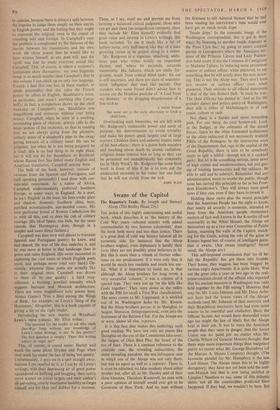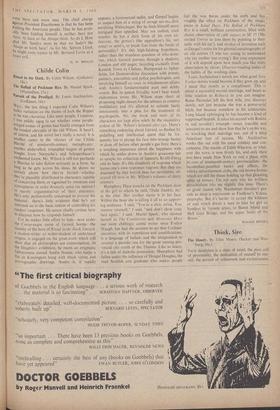Swans of the Capitol
THE jacket of this highly entertaining and useful book, which describes it as 'the history of the Cold War years—selected articles with added commentaries by two famous columnists,' does the book both more and less than justice. There is a great deal of cold war history (almost all its economic side, for instance) that the Alsop brothers neglect; even diplomacy is hardly their forte (they are not possibly great believers in it). But this is more than a rehash of former reflec- tions on our predicament. If it were only that, it would be much less readable and much less use- ful. What it is important to insist on, is that although the Alsop brothers for long wrote a very successful 'column,' it was a column of a special type. They were not up 'on the hills like Gods together.' They were down in the valley. with the PRI (to recall a First War classification). The news comes to Mr. Lippmann; it is winkled out of its Washington holes by Mr. Reston. But the Alsop brothers pursue it, to Shanghai, to Saigon, Morocco. Dniepropetrovsk, even into the fastnesses of the Reform Club. For the Alsops are or were, above all else, reporters.
It is this fact that makes this anthology such good reading. We have not only set pieces like Shanghai on the eve of the Communist take-over; the Saigon of Dien Bien Phu; the Israel of the eve of Suez. There is a constant reference to the concrete case, the revealing indiscretion, the more revealing anecdote, the not infrequent case in which one of the Alsops was not only there, but was an agent as well as a reporter. There is, it must be admitted, no false modesty about either brother but, after all, as Mr. Dooley said of their close kinsman, Theodore Roosevelt, no man with a poor opinion of himself would ever get to be Governor of New York. And no man without.
the firmness to tell Admiral Strauss that he had been wasting his interviewer's time would ever have got so much inside dope.
'Inside dope.' In the romantic image of the Washington correspondent, this is got in three ways. By listening to another inside dopester at the Press Club bar; by going to smart cocktail parties in Georgetown where the American ver- sions of the Princess Lieven and Lady Palmer- ston hold court, if not the Contessa di Castiglione or Madame Tallien; by inducing some prominent senator or cabinet officer, while plastered, to say something that he will sourly deny the next morn- ing. This is not the Alsop way. They don't trust any senator or cabinet officer even when plastered. Their attitude to all official statements is that of the late Robert Dell. 'It must be true. The Quai d'Orsay has denied it.' And as for the grandes dames and petites amies of Washington, their talk is either of Michelangelo or of real estate, culture or cash.
No; there is a harder and more rewarding path. For one thing, do. your homework. Look at the Budget, at the estimates of the armed forces, listen 'to the often frustrated technicians or the often indiscreet if not necessarily truthful PROs of the Pentagon. In the internecine wars of the Departments that rage in the capital of the Great Republic, there is sure to be somebody ready to spill a bibful—though not at a cocktail party. But let it be something serious, some news of high crimes and misdemeanours, not just gos- sip of feuding bureaucrats and the military. Be able to add and to subtract. Remember that any administration wants to soothe the public, though none has carried this principle so far as has Presi- dent Eisenhower's. They will always issue good news if they can, even if they have to invent it.
Holding these views plus the moral principle that the American People has the right to know, that nearly all security is nonsense, intended to keep from the American people elementary matters of fact well known in the Kremlin (if not necessarily in the White House), the Alsops set themselves up as a two-man Committee of Public Safety, manning the walls of the Capitol, watch- ing for the Gauls, acting the role of the geese in Roman legend but, of course, of intelligent geese, that is swans. (Are swans intelligent? Never mind; the Alsops are.) This self-imposed commission that 'no ill be- fall the Republic' has got them into trouble. Their house, they suggest, has been 'bugged' by various angry departments. It is quite likely. Was not the great joke a year or two ago in the real- estate-cocktail-circuit of the official who reported that his ancient mansion in Washington was 'only held together by the FBI wiring'? However that may be, Mr. Louis Johnson and Mr. Dean Ache- son have had the lowest views of the Alsops' methods (and Mr. Johnson of their motives), and their Republican successors have had even more reason to be resentful and vindictive. Here, the Official Secrets Act would have descended years ago (so might the law of libel). But the Alsops kept at their job. It was to warn the American people that they were in danger, that the Soviet Union was no 'paint job' no matter what Mr. Charlie Wilson (of General Motors) thought; that there were more important things than budgetary purity no matter what Mr. George Humphrey (of the Marcus A. Hanna Company) thought. (The favourite parallel for Mr. Humphrey is the late Lord Simon. The Alsops mean this to be highly derogatory; they have not yet been sold the anti- anti-Munich line that is now being peddled in London.) Needless to say, some of this polemic dates; not all the catastrophes predicted have happened. If they had, we wouldn't be here. But some have and more may. The chief charge against President Eisenhower is that he has been kidding the American people. That he has prob- ably been kidding himself is neither here nor there. At least, so the Alsops think. So do I. How glad Mr. Sandys must be that we hadn't the Alsops at work here! As for Mr. Selwyn Lloyd, he might even rejoice in Mr. Bernard Levin as a lesser evil.
D. W. BROGAN



































 Previous page
Previous page